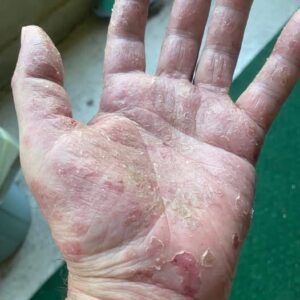Just because something is common, doesn’t mean it is safe. This is the case with Betel nuts, which people have been chewing in parts of Asia and the Pacific for generations, potentially even for thousands of years. Unfortunately, despite its popularity, this practice is extremely dangerous, as the WHO now classifies this nut as a carcinogen. This is what you should know.
What are Betel Nuts?
Betel nuts have a long history in South and Southeast Asia and the Pacific Basin and are commonly chewed by millions of people across the world. In its most basic form, betel nut is a seed of the Areca catechu, a type of palm tree. It is commonly chewed after being ground up or sliced and wrapped in leaves of the Piper betle vine that have been coated with lime. This forms what is known as a betel quid. Tobacco or flavorful spices may also be added. (1)
Read: 10 Warning Signs of Lung Cancer
What Are They Used For?
Many people chew betel nuts for the energy boost and feelings of euphoria and well-being it produces. This is because the nut contains alkaloids that release adrenaline. Some traditional beliefs also hold that it may offer relief for a range of ailments, from dry mouth to digestive problems. However, research has revealed that despite one or two incomplete or non-followed studies that show potential benefits, this nut is bad news. More extensive research has shown that regular use of betel nut has serious health risks, including driving record rates of cancer in some populations. (2)
Classified As A Carcinogen
According to the World Health Organization (WHO), betel nut is classified as a carcinogen. Many studies have shown a convincing link between betel nut use and cancer of the mouth and esophagus. A study in the Journal of the American Dental Association reports that betel nut users are at a higher risk for oral submucous fibrosis. This is an incurable condition that can cause stiffness in the mouth and eventually the loss of jaw movement. Regular chewing of betel nut can also cause gum irritation and tooth decay, with teeth becoming permanently stained deep red or even black. (3)
An early study published in the American Society for Clinical Nutrition found a strong connection between betel nuts and an increased risk of cardiovascular disease, metabolic syndrome, and obesity. Betel nuts may also interact with other drugs or herbal supplements and could cause toxic reactions in the body or reduce the effects of medications. Regular betel nut use may also lead to dependency and withdrawal symptoms. (4)
Read: A Single Bite of This Thai Dish Can Give You Liver Cancer
Popular Despite the Danger
The U.S. Food and Drug Administration (FDA) does not consider betel nut safe for chewing or eating. It has placed the nut on its Poisonous Plants Database. The Centers for Disease Control and Prevention (CDC) warns of several medical conditions associated with betel nut use, including oral submucous fibrosis, oral cancer, addiction, and reproductive issues, including low birth weight in newborns.
Despite these alarming health risks, chewing betel nut remains a time-honored custom in many countries. The WHO estimates that around 600 million people use some form of betel nut, with it being one of the most popular psychoactive substances in the world. However, health organizations and governments around the globe are taking steps to increase awareness of betel nut risks and reduce its use. Taiwan has declared an annual “Betel Nut Prevention Day,” and city officials in Taipei now fine anyone seen spitting betel nut juice and require them to attend withdrawal classes. The WHO has released an action plan designed to reduce betel nut use in the Western Pacific, calling for a combination of policy measures, public awareness campaigns, and community outreach.
The Bottom Line
Although chewing betel nut has a long history and cultural significance, the dangers regular use presents are well documented. Record rates of cancer, oral submucous fibrosis, tooth decay, and other health risks can be linked to the chewing of betel nut. Health organizations and governments around the globe must continue to take steps to raise awareness of the significant health risks associated with betel nuts and curb the practice to promote overall public health.





